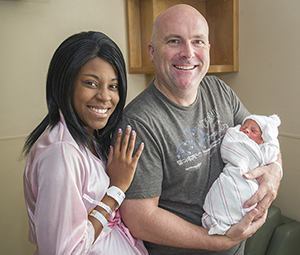Vaginal delivery: What to expect now that you're home
Congratulations on the birth of your baby. Like pregnancy, the newborn period can be a time of excitement, joy and exhaustion. You may look at your wondrous little baby and feel happy. You may also be overwhelmed by your new sleep hours and responsibilities.
At first, babies often sleep during the days and are awake at night. They don't have a pattern or routine. They may make sudden gasps, jerk themselves awake or look like they have crossed eyes. These are all normal, and they may even make you smile.
In these first weeks after delivery, try to take good care of yourself. It may take four to six weeks to feel like yourself again. You'll probably feel very tired for several weeks. Your days will be full of ups and downs, but lots of joy as well.
Follow-up care is a key part of your treatment and safety
Be sure to make and go to all appointments, and call your doctor if you're having problems. It's also good to know your test results and keep a list of the medications you take.
The following information gives you a general idea about how long it will take for you to recover. Realize that each mother recovers at a different pace. Follow the steps below to get better as quickly as possible.

Take care of your body after delivery
- Use pads instead of tampons for the bloody flow that may last as long as two weeks
- Ease cramps with ibuprofen (Advil, Motrin)
- Ease soreness of hemorrhoids and the area between your vagina and rectum with ice compresses or witch hazel pads
- Ease constipation by drinking lots of fluids and eating high-fiber foods. Ask your doctor about over-the-counter stool softeners.
- Cleanse yourself with a gentle squeeze of warm water from a bottle instead of wiping with toilet paper
- Take a sitz bath in warm water several times a day
- Wear a good nursing bra. Ease sore and swollen breasts with warm, wet washcloths.
- If you're not breastfeeding, use ice rather than heat for breast soreness
- Your period may not start for several months if you're breastfeeding. When you do get your period, you may bleed more and longer than you did before you got pregnant.
- Wait until you're healed — about four to six weeks — before you have sexual intercourse. Your doctor will tell you when it's OK to have sex.
- Try not to travel with your baby for five to six weeks. If you take a long car trip, make frequent stops to walk around and stretch.
Avoid exhaustion
- Rest every day. Try to nap when your baby naps.
- Ask another adult to be with you for a few days after delivery
- Plan for child care if you have other children
- Stay flexible so you can eat at odd hours and sleep when you need to. Both you and your baby are making new schedules.
- Plan small trips to get out of the house. Change can make you feel less tired.
- Ask for help with housework, cooking and shopping. Remind yourself that your job is to care for your baby.
Know about help for postpartum depression
- Baby blues are common for the first one to two weeks after birth. You may cry or feel sad or irritable for no reason.
- Rest whenever you can. Being tired makes it harder to handle your emotions.
- Go for walks with your baby
- Talk to your partner, friends and family about your feelings
- If your symptoms last for more than a few weeks, or if you feel very depressed, ask your doctor for help
- Postpartum depression can be treated. Support groups and counseling can help. Sometimes medicine can also help.
Stay healthy
- Eat healthy foods so you have more energy, make good breast milk and lose extra baby pounds
- If you breastfeed, avoid alcohol and drugs. If you quit using tobacco during pregnancy, congratulations. Stay smoke-free.
- Start daily exercise after four to six weeks, but rest when you feel tired
- Learn exercises to tone your belly. Do Kegel exercises to regain strength in your pelvic muscles. You can do these exercises while you stand or sit:
- Squeeze the same muscles you would use to stop your urine. Your belly and thighs shouldn't move.
- Hold the squeeze for three seconds, and then relax for three seconds.
- Start with three seconds. Then add one second each week until you're able to squeeze for 10 seconds.
- Repeat the exercise 10 to 15 times for each session. Do three or more sessions each day.
- Find a class with an exercise time for new mothers and babies
When should you call for help?
Call 911 anytime you think you may need emergency care. For example, call if:
- You passed out (lost consciousness)
- You have thoughts of harming yourself, your baby or another person
Call your doctor now or seek immediate medical care if:
- You have severe vaginal bleeding. This means that you're soaking through a pad every hour for two or more hours.
- You're dizzy or lightheaded or feel like you may faint
- You have new belly pain, or your pain gets worse
- You have a fever
Watch closely for changes in your health, and be sure to contact your doctor if:
- Your vaginal bleeding seems to be getting heavier
- You have new or worse vaginal discharge
- You feel sad, anxious or hopeless for more than a few days
- You don't get better as expected
How can you learn more?
Log into your MyChart account and enter A461 in the search box to learn more on this topic.